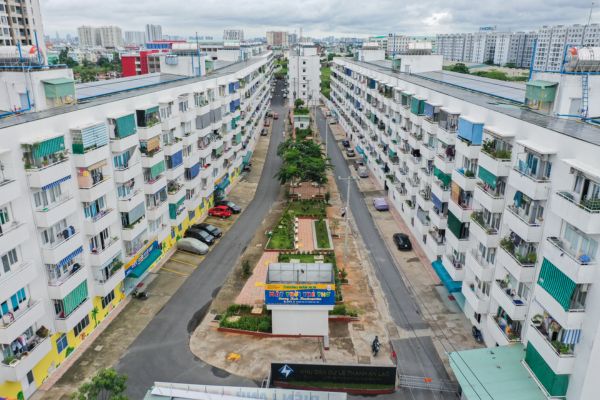Strengthening the Leadership of the Communist Party Towards Social Housing Development Work in the New Situation
Strengthening the Leadership of the Communist Party in the Development of Social Housing in the New Situation
The Central Executive Committee issued Directive 34-CT/TW of 2024 on “Strengthening the Leadership of the Communist Party in the Development of Social Housing in the New Situation.”
In terms of the situation, throughout the process of renovation, construction, and development of the country, our Communist Party and State have always paid attention to the development of housing for the people, especially social housing.
To date, the country has completed the construction of 195,000 social housing units, and approximately 374,000 social housing units have been approved for investment and started construction, granted construction permits.
Support policies for housing through targeted programs for those who contributed to the revolution, poor households, near-poor households in rural areas, and families in rural areas frequently affected by natural disasters and climate change have been implemented uniformly and achieved many positive results.
In addition to the achieved results, the development of social housing still has some limitations such as:
- Many targets for social housing development in the National Housing Development Strategy until 2020 and vision 2030 were not achieved;
- The supply of social housing is limited compared to actual demand;
- The average price of social housing is still too high compared to the income of the beneficiaries;
- The state management of social housing still has many weaknesses and inadequacies;
- The rate of land fund allocated for the development of social housing in urban areas is low;
- Government budget support for preferential credit programs for social housing is still low, and it has not strongly mobilized social resources to participate;
- The situation of temporary houses, dilapidated houses, especially in difficult areas heavily affected by natural disasters and climate change, still persists.
The causes of these limitations are primarily due to some Party committees, Party organizations, and governments, especially the leaders, not having a deep and comprehensive understanding, and lacking determination in the leadership and direction of social housing development and the implementation of housing support policies for policy beneficiaries; the legal system, mechanisms, and policies on social housing development have been slowly renewed, perfected, lacking breakthroughs to attract non-state resources for the development of social housing; the coordination between related agencies is not close; the inspection, supervision, detection, and handling of violations in social housing development are not regular and lack effectiveness.

Strengthening the Leadership of the Communist Party in Social Housing Development in the New Situation (Image from the Internet)
How does the Vietnam General Confederation of Labor participate in the development of social housing with union financial resources as per Directive 34-CT/TW?
Based on Section 3 of Directive 34-CT/TW of 2024 on strengthening the leadership of the Communist Party in social housing development in the new situation. Specifically:
The Secretariat requests a review and completion of the legal system related to social housing, especially concerning financial mechanisms, resource use, land, investment, public investment, construction, bidding, urban and rural planning, urban development management, public asset management and use, tax policy, and industrial park and economic zone management.
Support and preferential policies for beneficiaries of social housing policies must ensure transparency, fairness, and proper targeting; raise the level of housing support for war veterans and other policy beneficiaries in targeted programs.
Accurately and fully calculate reasonable and valid costs in determining the price of social housing.
Research the promulgation of specific mechanisms and policies on social housing for workers and the people’s armed forces.
Complete legislation and create favorable mechanisms and policies for the Vietnam General Confederation of Labor to participate in social housing development with union financial resources.
Issue mechanisms and policies that facilitate and proactively allow localities to allocate budgets for social housing project construction, undertake compensation, site clearance, and resettlement support to have clean land funds for social housing; invest in technical infrastructure outside social housing construction projects, connect technical infrastructure systems, and ensure the synchronization of social infrastructure inside and outside the project areas.
Promote administrative reform, create favorable conditions for enterprises to participate in social housing investment and development, and allow beneficiaries to easily access social housing; minimize the maximum time required for administrative procedures in investment, construction, business, sales, management, and use of social housing.
Implement shortened administrative procedures for land allocation, site clearance, investment in construction, and selection of investors for social housing projects... ensuring quick, convenient, transparent, and public processes.
Adopt incentive and preferential policies to encourage the development of social housing in a green model, utilizing energy-saving practices, sustainable development, and low carbon emissions.
In Directive 34-CT/TW of 2024, the Secretariat requests the completion of legislation and the creation of favorable mechanisms and policies for the Vietnam General Confederation of Labor to participate in social housing development with union financial resources.
According to Directive 34, should social housing be near schools and medical facilities?
In Directive 34-CT/TW of 2024, it is clearly stated that social housing and housing supported by the State in targeted programs, worker accommodation must ensure construction quality, architectural standards, landscaping, and meet all standards, technical regulations, security, safety, fire prevention and fighting, and synchronization of essential technical and social infrastructure (medical, educational, cultural...).
LawNet